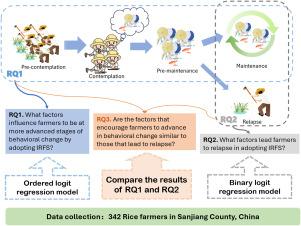Factors influencing the progressive adoption of integrated rice-fish systems by farmers and its relapse
IF 6.1
1区 农林科学
Q1 AGRICULTURE, MULTIDISCIPLINARY
引用次数: 0
Abstract
CONTEXT
Integrated farming systems provide high protein and energy yields per unit of land and increase farm income, particularly for smallholder farmers in land-scarce areas. However, the adoption rate by farmers is low, and some farmers discontinue after adoption (relapse).
OBJECTIVE
We have three objectives, first, to subdivide the adoption stages of farmers and explore the influencing factors that affect each stage. Second to examine the factors that lead farmers to relapse. Third to test the similarity between these factors.
METHODS
In this study, we applied a modified transtheoretical model of behavioral change combined with key concepts from the theory of planned behavior to data collected from farmers adopting an integrated rice–fish system in Sanjiang County, China.
RESULTS AND CONCLUSIONS
We refined the adoption process into four progressive behavioral stages (pre-contemplation, contemplation, pre-maintenance, and maintenance) and an additional unexpected stage (relapse). As the stages progressed, the effect of family farm income transitioned from negative to positive. In all stages, farmers with stronger perceived behavioral control over finance and technology were more likely to change to more advanced stages. Factors such as attitude toward economic benefits, subjective norms, government and policy evaluations, and family laborers is related to farmers' relapse. We also demonstrated that the factors incentivizing farmers to progress to more advanced behavioral stages were not the same as those leading to relapse. Thus, policymakers must consider and address these inconsistencies.
SIGNIFICANCE
This study provides new insights into integrated farming adoption and relapse and has implications for designing intervention policies for farmers at different behavioral stages.

影响农民逐步采用稻田养鱼综合系统及其复发的因素
背景综合耕作系统可在单位土地上提供高蛋白和高能量,并增加农业收入,尤其是对土地稀缺地区的小农而言。我们有三个目标:第一,细分农民的采用阶段,探讨影响各阶段的影响因素。第二,研究导致农民重新采用的因素。结果与结论我们将采用过程细化为四个渐进的行为阶段(前考虑、考虑、维持前和维持)和一个额外的意外阶段(复发)。随着各阶段的进展,家庭农场收入的影响由负转正。在所有阶段中,对资金和技术有较强行为控制感知的农民更有可能进入更高级阶段。对经济效益的态度、主观规范、政府和政策评价以及家庭劳动力等因素与农民的复种有关。我们还证明,激励农民进入更高级行为阶段的因素与导致复发的因素并不相同。本研究为综合农业的采用和复发提供了新的见解,并对为处于不同行为阶段的农民设计干预政策产生了影响。
本文章由计算机程序翻译,如有差异,请以英文原文为准。
求助全文
约1分钟内获得全文
求助全文
来源期刊

Agricultural Systems
农林科学-农业综合
CiteScore
13.30
自引率
7.60%
发文量
174
审稿时长
30 days
期刊介绍:
Agricultural Systems is an international journal that deals with interactions - among the components of agricultural systems, among hierarchical levels of agricultural systems, between agricultural and other land use systems, and between agricultural systems and their natural, social and economic environments.
The scope includes the development and application of systems analysis methodologies in the following areas:
Systems approaches in the sustainable intensification of agriculture; pathways for sustainable intensification; crop-livestock integration; farm-level resource allocation; quantification of benefits and trade-offs at farm to landscape levels; integrative, participatory and dynamic modelling approaches for qualitative and quantitative assessments of agricultural systems and decision making;
The interactions between agricultural and non-agricultural landscapes; the multiple services of agricultural systems; food security and the environment;
Global change and adaptation science; transformational adaptations as driven by changes in climate, policy, values and attitudes influencing the design of farming systems;
Development and application of farming systems design tools and methods for impact, scenario and case study analysis; managing the complexities of dynamic agricultural systems; innovation systems and multi stakeholder arrangements that support or promote change and (or) inform policy decisions.
 求助内容:
求助内容: 应助结果提醒方式:
应助结果提醒方式:


